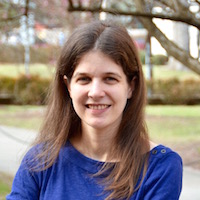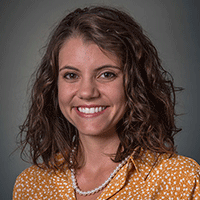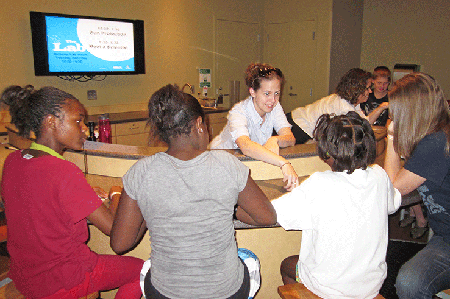CEHS researchers introduce youngsters to science through museum lab program
February 15, 2018
Alison Singer, PhD, postdoctoral research associate in epidemiology, and Katie Mulvaney, doctoral student in environmental sciences and engineering, both at the UNC Gillings School of Global Public Health, were featured at the N.C. Museum of Life and Sciences’ “The Lab,” in Durham, N.C., on Jan. 20.
Singer and Mulvaney are environmental scientists affiliated with the UNC Center for Environmental Health and Susceptibility (CEHS).
The Lab, a program for children ages four to 12 years of age, features working scientists who introduce young people to basic scientific concepts.
The Jan. 20 event, which drew more than 100 attendees, focused on air and water pollution. Singer and Mulvaney facilitated stations at which participants could test the potential of hydrogen (pH) levels of water, explore the changes in trees related to carbon dioxide levels in the atmosphere, and test dry ice, to learn how carbon dioxide makes water become acidic.
Mulvaney said the experience helped her practice her skills at the boundary of science and policy.
“As an engineer and scientist by training, it’s good for me to talk with people outside my technical domain about my research,” she said. “Communicating on a young person’s level helps the audience understand the work, and helps clarify important aspects for me, as well.”
It is also important, Mulvaney said, to have a forum in which people actually can converse with a scientist rather than reading a description in a news article.
“The conversation allows scientific discoveries to have nuance and provides insight into the kinds of activities scientists take part in,” she said. “This is especially true for young people. Children of all genders, races and socio-economic backgrounds should have the opportunity to explore being a scientist – and to have fun with science outside the pressures of a classroom.”
Singer agreed.
“It’s important for young people to see that scientists don’t fit a single mold,” she said. “We study a variety of different and exciting subjects. Hopefully, through activities such as these, we can encourage children to continue to develop their interests in science.”
At least one participant found an important take-away from the event.
“Now, I’ve met two women scientists,” one young girl was overheard saying. “I want to be one, too!”
The Lab at the Museum of Life and Science is open throughout the week. Its next “Meet a Scientist” Saturday event, on Feb. 24, will feature oceanographers.
The UNC Center for Environmental Health and Susceptibility aims to translate interdisciplinary research on environmental health threats to improve public health in North Carolina. The center is directed by Melissa Troester, PhD, professor of epidemiology at the Gillings School.
Gillings School of Global Public Health contact: David Pesci, director of communications, (919) 962-2600 or dpesci@unc.edu



